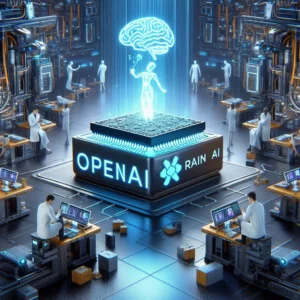OpenAI’s Strategic Move Investing $51 Million in AI Chip Startup Rain

Introduction
In a bold move, OpenAI, under the leadership of CEO Sam Altman, has entered into a major financial commitment with a cutting-edge AI chip startup, Rain. This deal, involving a staggering $51 million investment, highlights OpenAI’s intent to push the boundaries of AI technology. This article delves into the nuances of this investment and its implications for the future of AI.
OpenAI’s Investment in Rain: A Strategic Partnership

OpenAI’s decision to invest $51 million in Rain, a startup developing brain-inspired AI chips, is not just a financial transaction but a strategic partnership. Rain, located in close proximity to OpenAI’s headquarters in San Francisco, is pioneering a neuromorphic processing unit (NPU) designed to mimic human brain functions. This technology promises to revolutionize AI computation, offering potentially vast improvements over current chip designs.
The Role of Sam Altman
Sam Altman, reinstated as OpenAI’s CEO, played a pivotal role in this deal. His personal investment in Rain, coupled with his leadership at OpenAI, signifies a deep commitment to the advancement of AI technology. This move also showcases how Altman’s network and investments intertwine with his role at OpenAI, reflecting his influence in Silicon Valley’s tech landscape.
Implications for AI Development
OpenAI’s investment in Rain’s NPU technology could herald a new era in AI hardware. With promises of significantly more computing power and energy efficiency, these chips could dramatically accelerate AI research and development. This technology could alleviate current hardware constraints that often limit AI projects, including those at OpenAI.
Challenges and Controversies
However, this deal is not without its challenges and controversies. The intertwining of Altman’s personal investments with his professional role has raised questions about potential conflicts of interest. Additionally, the involvement of foreign investments in Rain, particularly from Saudi Arabia, has sparked security concerns, leading to government scrutiny.
Security and Compliance
The U.S. government’s interest in foreign investments in critical technologies like AI chips underscores the national security implications of such deals. Rain’s navigation of these complex dynamics, including the divestment of Saudi Arabian funds, highlights the challenges startups face in balancing innovation with compliance and security concerns.
Future Outlook
As AI technology continues to evolve rapidly, partnerships like the one between OpenAI and Rain are likely to become more common. These collaborations represent a symbiotic relationship between AI research organizations and hardware developers, each driving the other towards greater innovation.
The Broader AI Ecosystem
This deal also underscores the growing importance of specialized AI chips in the broader AI ecosystem. As AI applications become more complex and widespread, the demand for hardware that can efficiently handle these tasks is likely to increase significantly.
Conclusion
OpenAI’s investment in Rain AI represents a strategic move in the ever-evolving landscape of AI technology. While it comes with its set of challenges and controversies, the potential benefits of this partnership in advancing AI capabilities are immense. As we look to the future, such collaborations between AI research entities and specialized hardware developers will be crucial in pushing the boundaries of what’s possible in AI.




